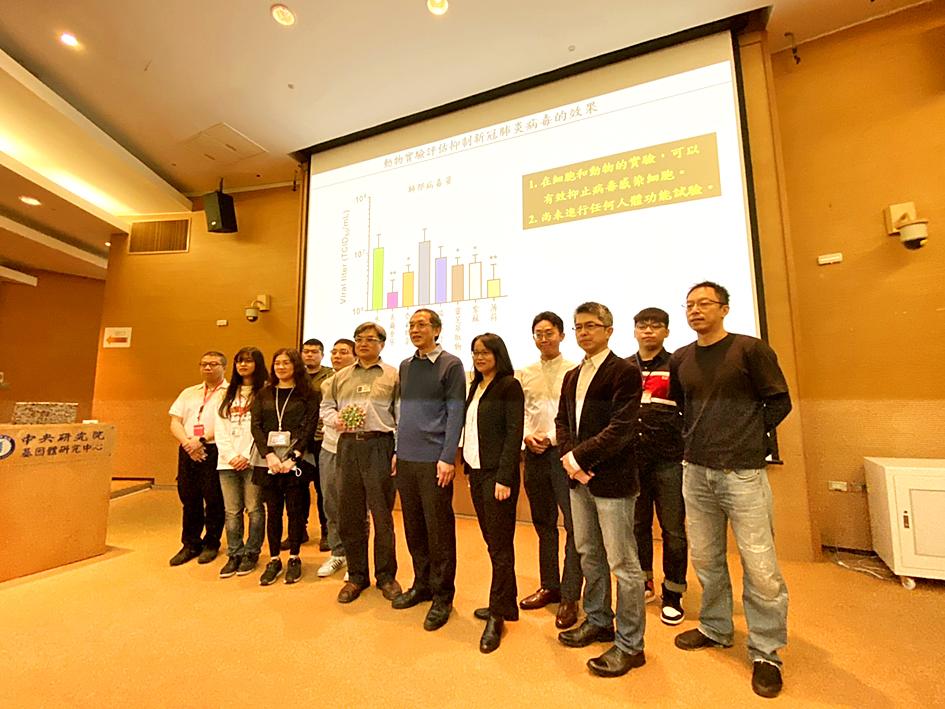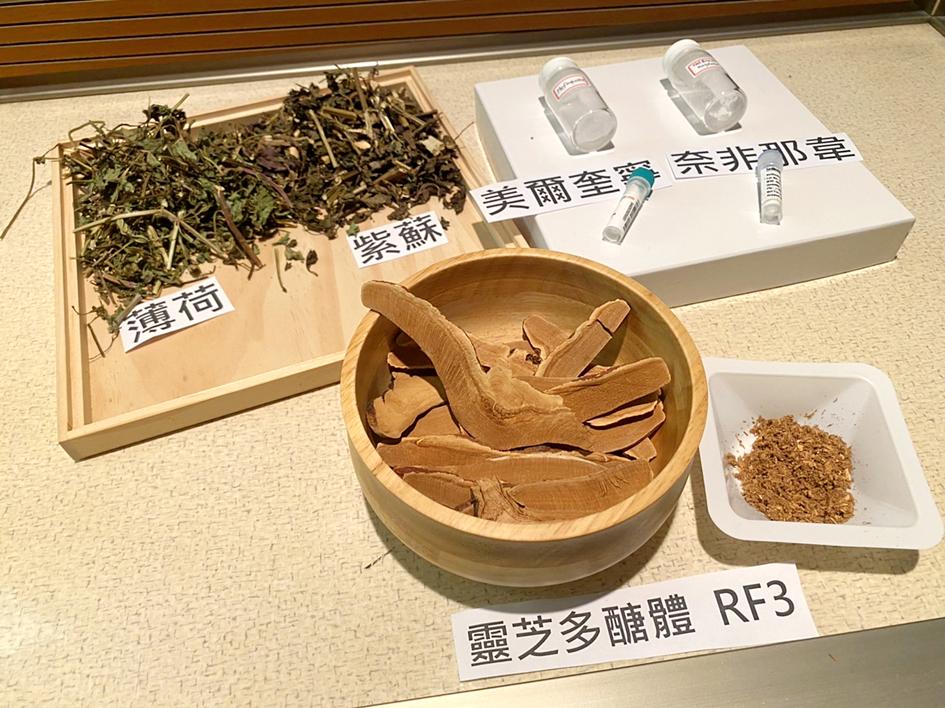Laboratory experiments have showed that five treatments, including three herbal medicines, are potential inhibitors of SARS-CoV-2, a team including former Academia Sinica president Wong Chi-huey (翁啟惠) said yesterday.
The team spoke about its findings at a news conference in Taipei after the study was published in the Proceedings of the National Academy of Sciences of the United States of America journal on Jan. 15.
Academia Sinica President James Liao (廖俊智) in February last year convened a research platform to seek treatments for COVID-19, while Wong and Academia Sinica’s Genomics Research Center director Hung Shang-cheng (洪上程) assembled colleagues to determine whether existing drugs might treat the disease.

Photo: CNA
The researchers obtained the genome of SARS-CoV-2 — the virus that causes COVID-19 — from the Global Initiative on Sharing All Influenza Data and created a computational model, the team said.
More than 1,000 of the 1,273 spike proteins on the virus are likely to mutate, which showed that efforts to create vaccines utilizing traditional processes might be a “wild goose chase,” as the treatment development could never keep pace with the rate at which the virus mutates, the team said.
“The fastest way to help ease the [COVID-19] situation is to find clinically available drugs that can be used to fight off infection,” Wong was quoted as saying in a news release. “They should be oral drugs that people can take themselves when they test positive.”

Photo: CNA
The team examined 2,855 human and animal drugs approved by the US Food and Drug Administration, as well as 190 Chinese herbal medicines that are considered effective to alleviate viral infections, the team said.
After screening the drugs at the institution’s High Throughput Drug Screening Facility and P3 Lab, they narrowed the candidates down to 15, they said.
They created an animal model using golden Syrian hamsters that were exposed to SARS-CoV-2, which were given the candidate treatments twice a day, the team said.
Lung tissue from the animals was examined after three days, they said.
Five candidates stood out in the experiment: Mefloquine, a malaria treatment; Nelfinavir, a treatment for AIDS; and three herbal extracts — Ganoderma lucidum, Perilla frutescens and Mentha haplocalyx, the team said.
While the five candidates showed antiviral effects, the timing of their effects and the way they act differ, meaning further research is needed, National Taiwan University professor of pharmacy Liang Pi-hui (梁碧惠) said.
For example, nelfinavir prevents viral replication by inhibiting protease activities, Liang said.
The next step is to identify active compounds and proper dosages before clinical development could begin, Wong said.

A preclearance service to facilitate entry for people traveling to select airports in Japan would be available from Thursday next week to Feb. 25 at Taiwan Taoyuan International Airport, Taoyuan International Airport Corp (TIAC) said on Tuesday. The service was first made available to Taiwanese travelers throughout the winter vacation of 2024 and during the Lunar New Year holiday. In addition to flights to the Japanese cities of Hakodate, Asahikawa, Akita, Sendai, Niigata, Okayama, Takamatsu, Kumamoto and Kagoshima, the service would be available to travelers to Kobe and Oita. The service can be accessed by passengers of 15 flight routes operated by

Alain Robert, known as the "French Spider-Man," praised Alex Honnold as exceptionally well-prepared after the US climber completed a free solo ascent of Taipei 101 yesterday. Robert said Honnold's ascent of the 508m-tall skyscraper in just more than one-and-a-half hours without using safety ropes or equipment was a remarkable achievement. "This is my life," he said in an interview conducted in French, adding that he liked the feeling of being "on the edge of danger." The 63-year-old Frenchman climbed Taipei 101 using ropes in December 2004, taking about four hours to reach the top. On a one-to-10 scale of difficulty, Robert said Taipei 101

Taiwanese and US defense groups are collaborating to introduce deployable, semi-autonomous manufacturing systems for drones and components in a boost to the nation’s supply chain resilience. Taiwan’s G-Tech Optroelectronics Corp subsidiary GTOC and the US’ Aerkomm Inc on Friday announced an agreement with fellow US-based Firestorm Lab to adopt the latter’s xCell, a technology featuring 3D printers fitted in 6.1m container units. The systems enable aerial platforms and parts to be produced in high volumes from dispersed nodes capable of rapid redeployment, to minimize the risk of enemy strikes and to meet field requirements, they said. Firestorm chief technology officer Ian Muceus said

MORE FALL: An investigation into one of Xi’s key cronies, part of a broader ‘anti-corruption’ drive, indicates that he might have a deep distrust in the military, an expert said China’s latest military purge underscores systemic risks in its shift from collective leadership to sole rule under Chinese President Xi Jinping (習近平), and could disrupt its chain of command and military capabilities, a national security official said yesterday. If decisionmaking within the Chinese Communist Party has become “irrational” under one-man rule, the Taiwan Strait and the regional situation must be approached with extreme caution, given unforeseen risks, they added. The anonymous official made the remarks as China’s Central Military Commission Vice Chairman Zhang Youxia (張又俠) and Joint Staff Department Chief of Staff Liu Zhenli (劉振立) were reportedly being investigated for suspected “serious